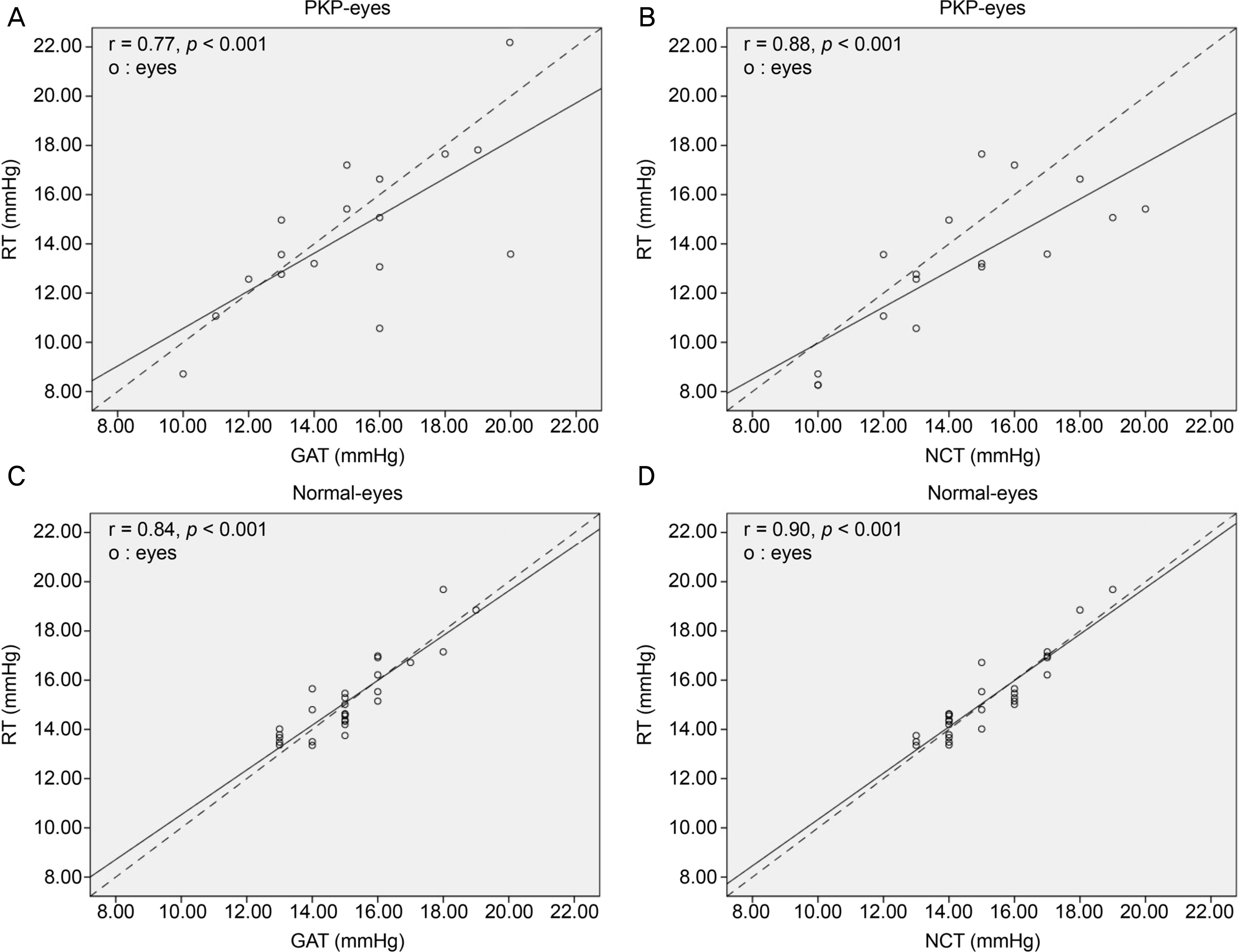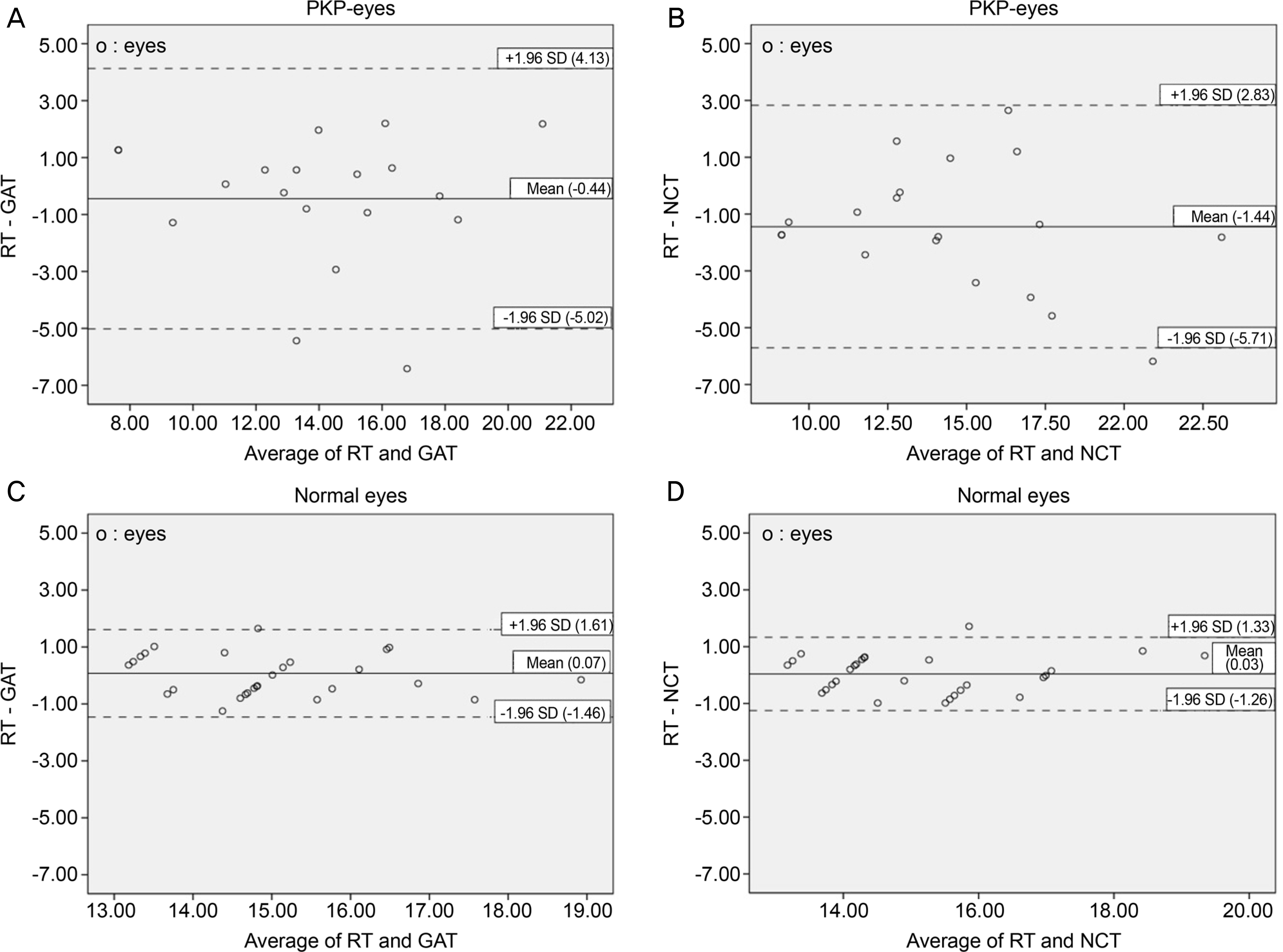Abstract
Purpose
To compare the measurements of the rebound tonometer (RT), Goldmann applanation tonometer (GAT) and non-contact tonometer (NCT) in patients who underwent penetrating keratoplasty (PKP), and to evaluate the reproducibility of the RT measurements.
Methods
This study included 19 PKP eyes and 28 normal eyes. We compared the intraocular pressure (IOP) measurements of the GAT and NCT with the RT in both groups using Spearman's correlation analysis and the Wilcoxon signed-rank test. The IOP, as measured with an RT in each group, was assessed with respect to reproducibility using the intraclass correlation coefficient (ICC).
Results
In normal eyes, there was no significant difference in the measurements obtained with the RT, GAT, and NCT (p > 0.050). In the patient group, the RT measurements were not significantly different from those of the GAT (p = 0.872), but they were significantly lower than those obtained with the NCT (p = 0.011). However, the RT measurements showed a relatively high correlation with those of the GAT and NCT (r = 0.770 and 0.879, respectively). The ICC of the RT was 0.986 for the PKP eye group and 0.961 for the normal eye group, both of which were highly reproducible.
Conclusions
In PKP eyes, the measurements obtained with the RT showed a relatively high correlation with those of the GAT and NCT, and the repeatability of the RT measurements was high and similar to those for normal eyes. The RT can therefore be considered a useful method for measuring the IOP in PKP eyes.
Go to : 
References
2. Goldberg DB, Schanzlin DJ, Brown SI. Incidence of increased abdominalpressure after keratoplasty. Am J Ophthalmol. 1981; 92:372–7.
3. Irvine AR, Kaufman HE. Intraocular pressure following abdominal keratoplasty. Am J Ophthalmol. 1969; 68:835–44.
4. Kohlhaas M, Boehm AG, Spoerl E, et al. Effect of central corneal thickness, corneal curvature, and axial length on applanation tonometry. Arch Ophthalmol. 2006; 124:471–6.

5. Liu J, Roberts CJ. Influence of corneal biomechanical properties on intraocular pressure measurement: quantitative analysis. J Cataract Refract Surg. 2005; 31:146–55.
6. Broman AT, Congdon NG, Bandeen-Roche K, Quigley HA. Influence of corneal structure, corneal responsiveness, and other ocular abdominal on tonometric measurement of intraocular pressure. J Glaucoma. 2007; 16:581–8.
7. Kageyama M, Hirooka K, Baba T, Shiraga F. Comparison of ICare rebound tonometer with noncontact tonometer in healthy children. J Glaucoma. 2011; 20:63–6.

8. Pakrou N, Gray T, Mills R, et al. Clinical comparison of the Icare tonometer and Goldmann applanation tonometry. J Glaucoma. 2008; 17:43–7.

9. Shields MB. The non-contact tonometer. Its value and limitations. Surv Ophthalmol. 1980; 24:211–9.

10. Vernon SA. Intra-eye pressure range and pulse profiles in normal with the Pulsair non-contact tonometer. Eye (Lond). 1993; 7(Pt 1):134–7.
11. Zhang Y, Zhao JL, Bian AL, et al. Effects of central corneal abdominal and corneal curvature on measurement of intraocular pressure with Goldmann applanation tonometer and non-contact tonometer. Zhonghua Yan Ke Za Zhi. 2009; 45:713–8.
12. Moreno-Montañés J, Gosende I, Caire J, García-Granero M. Comparation of the new rebound tonometer IOPen and the Goldmann tonometer, and their relationship to corneal properties. Eye (Lond). 2011; 25:50–6.

13. Sahin A, Basmak H, Niyaz L, Yildirim N. Reproducibility and abdominal of the ICare rebound tonometer in school children. J Glaucoma. 2007; 16:185–8.
14. Moreno-Montañés J, Olmo N, Zarranz-Ventura J, Heras-Mulero H. Dynamic contour tonometry in eyes after penetrating keratoplasty. Cornea. 2009; 28:836–7.

15. Rao VJ, Gnanaraj L, Mitchell KW, Figueiredo FC. Clinical abdominal of ocular blood flow tonometer, Tonopen, and Goldmann applanation tonometer for measuring intraocular pressure in postkeratoplasty eyes. Cornea. 2001; 20:834–8.
16. Shemesh G, Waisbourd M, Varssano D, et al. Measurements of abdominal pressure by Goldmann tonometry, Tonopen XL, and the transpalpebral tonometer, TGDc-01, after penetrating keratoplasty: a comparative study. Cornea. 2009; 28:724–28.
17. Geyer O, Mayron Y, Loewenstein A, et al. Tono-Pen tonometry in normal and in postkeratoplasty eyes. Br J Ophthalmol. 1992; 76:538–40.

18. Kirkness CM, Ficker LA. Risk factors for the development of postkeratoplasty glaucoma. Cornea. 1992; 11:427–32.

19. Fan JC, Chow K, Patel DV, McGhee CN. Corticosteroid-induced intraocular pressure elevation in keratoconus is common following uncomplicated penetrating keratoplasty. Eye (Lond). 2009; 23:2056–62.

20. Holladay JT, Allison ME, Prager TC. Goldmann applanation abdominal in patients with regular corneal astigmatism. Am J Ophthalmol. 1983; 96:90–3.
21. Rask G, Behndig A. Effects of corneal thickness, curvature, abdominal and direction of gaze on Goldmann applanation tonometry readings. Ophthalmic Res. 2006; 38:49–55.
22. Matsumoto T, Makino H, Uozato H, et al. The influence of corneal thickness and curvature on the difference between intraocular pressure measurements obtained with a non-contact tonometer and those with a Goldmann applanation tonometer. Jpn J Ophthalmol. 2000; 44:691.

23. Babalola OE, Kehinde AV, Iloegbunam AC, et al. A comparison of the Goldmann applanation and non-contact (Keeler Pulsair EasyEye) tonometers and the effect of central corneal thickness in indigenous indigenous African eyes. Ophthalmic Physiol Opt. 2009; 29:182–8.
24. Moreno-Montañés J, García N, Fernández-Hortelano A, García-Layana A. Rebound tonometer compared with goldmann abdominal in normal and pathologic corneas. Cornea. 2007; 26:427–30.
25. Scuderi GL, Cascone NC, Regine F, et al. Validity and limits of the rebound tonometer (ICare[R]): clinical study. Eur J Ophthalmol. 2011; 21:251–7.
26. Jorge J, Fernandes P, Queirós A, et al. Comparison of the IOPenand iCare rebound tonometers with the Goldmann tonometer in a abdominal population. Ophthalmic Physiol Opt. 2010; 30:108–12.
27. Poostchi A, Mitchell R, Nicholas S, et al. The iCare rebound abdominal: comparisons with Goldmann tonometry, and influence of central corneal thickness. Clin Exp Ophthalmol. 2009; 37:687–91.
28. Martinez-de-la-Casa JM, Jimenez-Santos M, Saenz-Frances F, et al. Performance of the rebound, noncontact and Goldmann abdominal tonometers in routine clinical practice. Acta Ophthalmol. 2011; 89:676–80.
29. Nakamura M, Darhad U, Tatsumi Y, et al. Agreement of rebound tonometer in measuring intraocular pressure with three types of abdominal tonometers. Am J Ophthalmol. 2006; 142:332–4.
30. Salvetat ML, Zeppieri M, Miani F, et al. Comparison of ICare abdominal and Goldmann applanation tonometry in normal corneas and in eyes with automated lamellar and penetrating keratoplasty. Eye (Lond). 2011; 25:642–50.
31. Brusini P, Salvetat ML, Zeppieri M, et al. Comparison of ICare abdominal with Goldmann applanation tonometer in glaucoma patients. J Glaucoma. 2006; 15:213–7.
Go to : 
 | Figure 1.Correlation of IOP obtained by RT, GAT and NCT for PKP eyes and normal eyes. (A) RT and GAT for PKP eyes (r = 0.77, p < 0.001). (B) RT and NCT for PKP eyes (r = 0.88, p < 0.001). (C) RT and GAT for normal eyes (r = 0.84, p < 0.001). (D) RT and NCT for normal eyes (r = 0.90, p < 0.001). The dashed line represents y = xand the solid line represents the linear regression. IOP = intraocular pressure; PKP = penetrating keratoplasty; RT = rebound tonometer; GAT = Goldmann applanation tonometer; NCT = noncontact tonometer. |
 | Figure 2.Bland-Altman plot of agreement between RT, GAT and NCT. The differences in IOP of two measurements are plotted against the mean of the two measurements. (A) RT and GAT for PKP eyes. (B) RT and NCT for PKP eyes. (C) RT and GAT for normal eyes. (D) RT and NCT for normal eyes. IOP = intraocular pressure; PKP = penetrating keratoplasty; RT = rebound tonometer; GAT = Goldmann applanation tonometer; NCT = noncontact tonometer; SD = standard deviation. |
Table 1.
Results of IOP measurement obtained by Rebound tonometer with GAT and NCT in PKP eyes and normal eyes
| Subjects | RT (mmHg) | GAT (mmHg) | NCT (mmHg) |
RT vs. GAt |
RT vs. NCt |
||
|---|---|---|---|---|---|---|---|
| Difference mean | p-value* | Difference mean | p-value* | ||||
| Normal eye (n = 28) | 15.18 ± 1.62 | 15.11 ± 1.57 | 15.14 ± 1.58 | +0.07 ± 0.78 | 0.724 | +0.03 ± 0.66 | 0.909 |
| Post PKP eye (n = 19) | 13.82 ± 3.61 | 14.26 ± 3.80 | 15.26 ± 4.23 | −0.44 ± 2.34 | 0.872 | −1.44 ± 2.18 | 0.011 |




 PDF
PDF ePub
ePub Citation
Citation Print
Print


 XML Download
XML Download